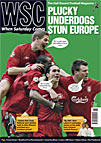 Racism, just an unsavoury "circumstance of the game" in Argentina, writes Martin Gambaratta
Racism, just an unsavoury "circumstance of the game" in Argentina, writes Martin Gambaratta
All continental trophies are hotly contested. But the Copa Libertadores, Latin America’s most coveted piece of football silverware, is like no other because of this unsavoury fact: on-the-field violence can happen in practically any game. Police in riot gear often pour onto the pitch to stop a fight and many times make things worse by siding with the home team. So, if you happened to be watching São Paulo play hard-tackling Quilmes (a smallish club from impoverished Greater Buenos Aires) on April 13, the scrap just before half-time would not have looked like something extraordinary. Two Quilmes defenders scuffled with Grafite, São Paulo’s towering centre-forward. One of the Quilmes players and Grafite, who retaliated, were sent off.
Another Quilmes defender, 26-year-old Leandro Desábato, got away with shouting abuse in Grafite’s face – as far as the referee was concerned. But after the final whistle something unprecedented – even by Copa Libertadores standards – happened. Brazilian police went on to the field and arrested Desábato for allegedly shouting racial abuse at Grafite. Desábato was held in jail for 40 hours and only released on bail (set by the Brazilians at an affordable $3,891). He was photographed handcuffed. Until then, Desábato was just an obscure name in Quilmes’ rough back four. Even when the news of his arrest made it to the front pages of the leading newspapers in Argentina, he was referred to as “the player”. Desábato, aware that he is not part of Argentina’s star-system, initially let others do the talking.
“You cannot consider this an act of discrimination when there is so much adrenalin involved,” said Argentina’s interior minister, Aníbal Fernández. Diego Maradona declared that Desábato’s punishment was “outrageous” but added: “Imagine if a Brazilian team played here tomorrow, they would try to find any excuse to throw them in jail.” Maradona also demanded action from Julio Grondona, the head of the Argentine Football Association. The latter, however, simply offered an incoherent public statement designed to avoid offending any of the parties involved. Grondona, who has been running AFA unchallenged since 1979, himself was recently forced to apologise to the large Jewish community in Argentina when he said in a interview that there were no Jewish referees in the first division “maybe because they don’t like difficult jobs”.
Many in Brazil were hailing the arrest as part of a campaign spearheaded by President Luiz Inácio Lula da Silva to fight racism, but national coach Carlos Alberto Parreira took a more cautious line: “I’d preferred it not to have gone beyond sporting boundaries.” Brazil are scheduled to play Argentina in a World Cup qualifier in Buenos Aires in June – Parreira may fear that his team will have to tread very carefully in Argentina to avoid the sort of orchestrated revenge Maradona warned of.
Only a week later did Desábato, who could face a jail sentence of up to three years if Grafite decides to press charges, speak up at a scantly covered press conference in Quilmes. The player insisted he did not call Grafite a racist name and complained he was held in a “depressing” jail. Guards repeatedly banged their rifle butts on the door of his cell, the disconsolate Desábato said. The bad news for Desábato is that Grafite, after expressing some doubts, said he was ready to press charges.
The South American Confederation suspended Desábato for a game, but said he could face a lengthier ban if found guilty. The press in Argentina reacted cautiously. Desábato did something wrong, a Channel 13 anchorman said on the eight o’clock news, but the punishment was too stiff.
As a country, Argentina often seems not to fully comprehend what racism is. Games have been stopped in the past when anti-Semitic songs are chanted. But nothing is done when practically an entire stadium reverberates to a song about sodomising “the negros from Brazil” every time Argentina play Brazil. The issue is made more complicated by the fact race and place of origin are often used as fond nicknames, especially in Buenos Aires. Leonardo Astrada, River Plate’s dark-skinned coach, is often referred to by everybody as El Negro Astrada.
For offence to be taken, and even this goes unpunished in the domestic league, you have to be called a “negro de mierda” (a shitty negro) – which is exactly what Grafite claims to have been called by players and fans when São Paulo played Quilmes away on March 16. Ater that game Quilmes, named after an Indian tribe that once lived in Buenos Aires province, wrote an apologetic letter to São Paulo. São Paulo welcomed the letter, written before the return game, saying it was the first time a club had apologised like that. But had the Brazilian club read carefully? In the letter, Quilmes urged São Paulo to understand that the slurs were uttered due to “circumstances of the game” – classic Grondona rhetoric. Racial incidents are often downplayed by commentators here as part of “the folklore of the game”. Whatever the outcome of the Quilmes case, the football community in Argentina simply doesn’t understand that it has a problem.
From WSC 220 June 2005. What was happening this month